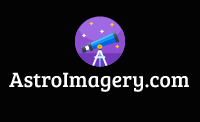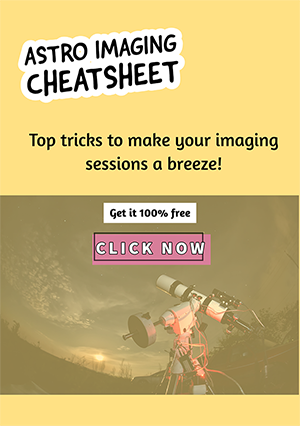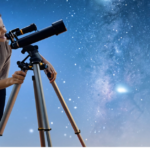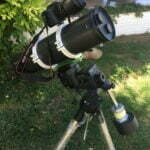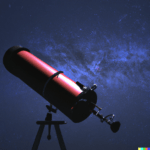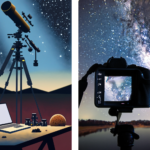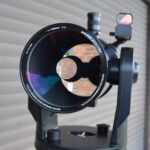This is a question many people wishing to enter the hobby might ask. The answer is not as straightforward as it seems, but generally, it is accepted that it is not easy. To find out why and if this hobby might be for you, keep reading.
Is astrophotography easy? No. It has a steep learning curve and involves photography, experimentation, computer skills, and a good eye. In addition, it can be expensive and requires patience. Progress can be quick, but astrophotography is an art that requires constant improvement.
The short answer, then, is that astrophotography is not easy. We’ll discuss what exactly it involves here, and then you can decide for yourself if it is something you want to commit your time to. Read on to learn all about the fascination and challenges of astrophotography.
Is Astrophotography Easy?
It could be said that astrophotography is easy to begin with, but still, there are many challenges when you start this hobby. One of the first challenges I faced was that I didn’t know much about photography or how to use a DSLR camera. I had to learn about photography settings like ISO, F-number, and shutter exposure time. If you know about photography this is a good start but focusing and taking exposures in the dark presents many problems for the beginner astrophotographer.
The easiest way to start astrophotography is to use just a DSLR with a tripod and no tracking.
These basics of nighttime photography can be learned quite quickly, and then you will be ready for your first attempts at astrophotography. Here is one of the first astrophotography images I took:
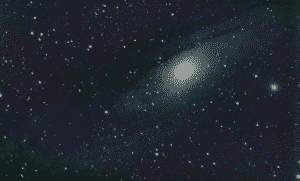
The above image was taken at the start of my journey as an astrophotographer. It doesn’t show much detail, but at the time, I was amazed because I saw a galaxy for the first time and was blown away that it was possible to photograph it. It was taken in my backyard using my Celestron 130-slt az-alt telescope.
After about six months of more experience, I was able to improve in leaps and bounds. Here is another later picture, which is much improved:
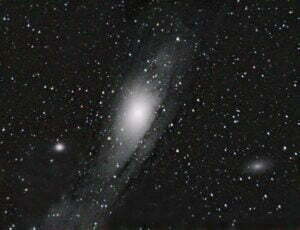
I plan to soon revisit Andromeda and take an up-to-date shot now that I have been doing astrophotography for two years. I have learned so much in that time about filters, exposure and integration time, stacking, and much more. I’m also lucky enough to live in a place where there are lots of clear skies!
The question I asked at the beginning of this article was, “Is astrophotography easy?” and after reading the above you should understand that the answer is actually that it becomes easier with experience. It takes time to learn how to do anything worthwhile and astrophotgraphy is no different.
Learning Astrophotography
Is astrophotography easy? For a beginner, I don’t think so. I recommend reading about it first and watching as many YouTube videos as you can to see if this hobby is for you. One forum I recommend is Cloudy Nights, where you can find interesting discussions on all things astronomy, including astrophotography and imaging. There are a tonne of great videos on Youtube, and I like those by Trevor Jones, Nico Carver, and Alyn Wallace in particular.
As we’ve discussed above, there is a lot of learning in astrophotography. You need to learn how to find, image, and process objects in space. You need to learn about the best equipment to use for the level you are at. You need to learn about what is out there in the sky. Are you interested in imaging the Milky Way, planets, galaxies, star clusters, or deep-sky objects like nebulae? What you are aiming to image will determine the techniques and equipment you need to use.
Before you get into this hobby, make sure you are aware of what it involves. This is what I am trying to lay out for you here on this page. So what is involved, and what challenges will you face?
Here are a few of the challenges involved and things you will need to learn:
- How to focus when you can’t see very much in your camera
- How to find your object and frame it
- How to stack your images
- How to process your images in a program such as Photoshop
- What different kinds of software you can use for astrophotography?
- Choosing and using a telescope, camera, and filters
- Cleaning your telescope mirror when necessary
- Understanding how many sub-exposures and what length is best for your target
- What to do about light pollution
- How to use auto-guiding for longer and better exposures
- How to research before you get any new equipment
Learning astrophotography requires patience and persistence. This hobby is very much trial and error and involves a lot of problem-solving along the way. It can be frustrating and difficult, but at other times, when it goes smoothly, it seems easy and enjoyable. To help you out, here are my 5 tips for improving your astrophotography – I’m sure they will make a huge difference!
So prepare yourself for a steep and long learning curve, as this is a hobby that can probably never be totally mastered.
How to Make Astrophotography Easy
Perhaps the question shouldn’t be, “Is astrophotography easy?” Maybe we should be asking, “how can we make astrophotography easier?”
There will also be challenges to your progress in astrophotography. I know how much I have struggled in my first couple of years doing this. However, there are simple steps you can follow to make astrophotography easier. Here are some of my suggestions:
- Read a forum like Cloudy Nights to learn as much as you can and benefit from others’ experiences or advice. Ask questions, and you’ll get helpful answers.
- Watch the many Youtube videos that can help you with all aspects of astrophotography, from buying and choosing equipment to processing images and how to use the various software options out there.
- Keep imaging as often as you can and focus, especially in the early stages, on improving an aspect of the process such as focusing, polar alignment, etc.
- Don’t be scared to try new things out and experiment to see what works best with your equipment and in your situation.
- Make sure you research well before buying new equipment. It is easy to buy something that either you are not ready for or that will require other equipment to incorporate into your setup.
- Don’t get carried away with buying filters; sometimes there are better things to spend your money on that will bring you better results quicker.
- Always take your time to set up your equipment correctly. Balancing your rig, polar aligning accurately, and focusing well are essential steps, and we all need to take time to get these basic steps done right before starting.
- Check and recheck sometimes a few times during a night of imaging. I don’t know how many hours and how many photos I have lost due to skipping something.
I hope this page has been helpful. You can always contact me if you want more help or to ask for more information.
